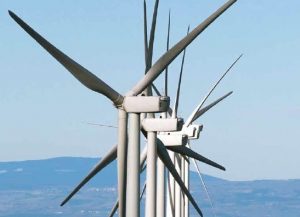In a new agreement between Drexel University and Community Energy, Inc., Drexel will purchase Renewable Energy Certificates equal to 100 percent of its energy use, making Drexel one of the top 50 purchasers of wind energy in the nation. This Renewable Energy Certificate purchase will ensure that 84,268 megawatt hours of electricity will be matched annually with wind energy entering the electricity grid. The Renewable Energy Credits will be supplied by renewable energy marketer and developer Community Energy. This purchase will place Drexel among the top five university purchasers in the nation, according to the current Environmental Protection Agency’s Green Power Partnership rankings.
“We are proud to be a leader among colleges and universities, and to do our part for the environment,” says James Tucker, Drexel senior vice president for Student Life and Administrative Services. “Having our electricity matched with clean, renewable energy is one piece of our larger commitment to sustainability. We hope other institutions will follow our lead and make the choice as well.”
Compared to the average generation mix in the national electric grid, the environmental benefit from this purchase is equal to offsetting approximately 60,518 metric tons of carbon dioxide per year, the annual impact of which is equivalent to the carbon sequestered by 12,904 acres of trees or removing 11,571 passenger vehicles from the road, according to the Environmental Protection Agency’s greenhouse gas equivalencies calculator.
“Drexel University realized the importance of renewable energy early on and Community Energy is proud of our long partnership,” according to Jay Carlis, Community Energy’s vice president. “The decision to substantially increase the university’s wind energy purchase to 100 percent of electricity usage establishes Drexel as a national leader in supporting environmental sustainability.”
Drexel was recently honored by PennFuture, a leading Pennsylvania environmental advocacy organization, with a Green Power Award for leadership in energy efficiency, including deploying an energy monitoring system at the main campus. Additional sustainability efforts include using biodiesel fuel for shuttle buses, purchasing hybrid and battery-powered vehicles, free bike share program, implementing a multitude of energy-saving controls and lighting efficiency measures, use of ice thermal energy for cooling, and wide-ranging recycling efforts. Learn more at www.drexel.edu.

























